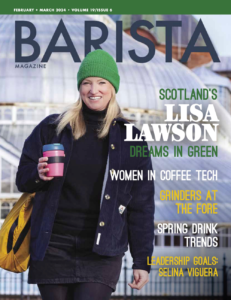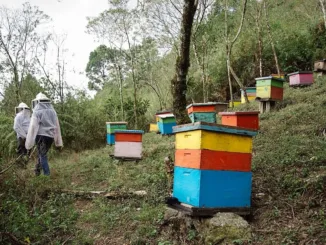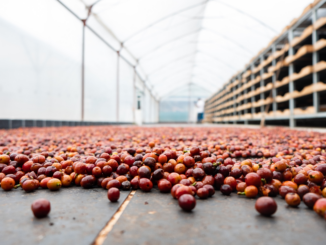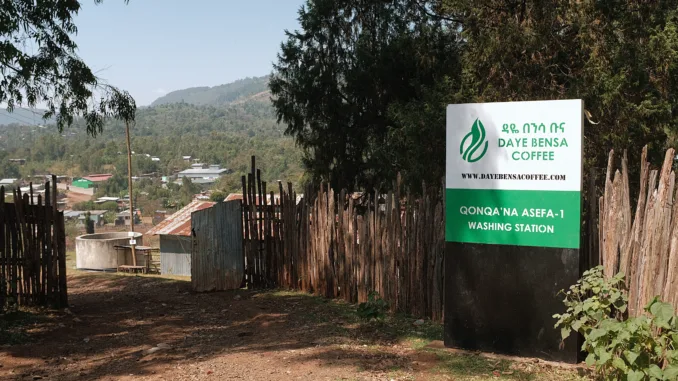
As the homeland of coffee and the fifth leading producer of coffee in the world, Ethiopia’s landscape is filled with producers growing coffee on small plots of land.
BY MICHAELA TOMCHEK
SPECIAL TO BARISTA MAGAZINE
Photos by Michaela Tomchek
Coffee in Ethiopia is a part of life. Coffee ceremonies are performed daily, and special altars are set up in each home to brew the traditional jebena jug of coffee and served in delicate white cups.
Not only is coffee a vital part of culture in Ethiopia, but it is the source of income for millions. Farmers grow coffee and sell it coffee to local washing stations; some also work at these stations as another source of income. Farmers thus rely on larger groups to buy and sell their coffee, marketing their exceptional beans throughout the world.
Daye Bensa’s Beginnings
One of these groups is Daye Bensa, based in the Sidama region of Ethiopia, in the Bensa district.
Started back in 1996 by brothers Asefa Dukamo Korma and Mulugeta Dukamo, the group began as producers and suppliers of coffee. The Qonqa’na washing station was their first in Bensa and was a place for farmers to bring their cherries to be processed and sold.
In 2006, Daye Bensa then began to export their coffee throughout the world rather than only selling within Ethiopia. Over the past decade, they’ve grown to become one of the largest exporting groups in Ethiopia, with a unique brand, connection, and story.
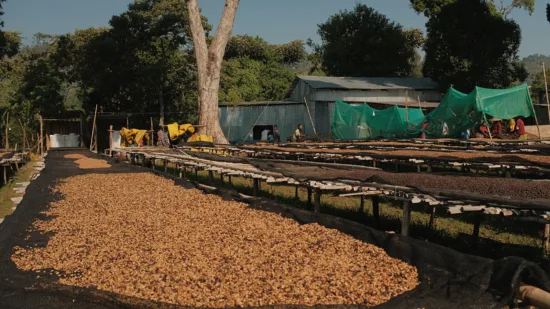
Growth and Expansion
Today, Daye Bensa runs and manages 16 washing stations and four dry mills throughout Sidama’s Bensa, Aroresa, and Chire districts. When driving through Bensa, the streets are filled with green and white signs indicating a Daye Bensa location. They have truly remade Bensa’s landscape. “In harvesting season, we source from 50,000 to 70,000 farmers, with an average farmland of 2 to 5 hectares,” says Abreham Ashagre, marketing director for Daye Bensa.
Processing with Daye Bensa
Once farmers bring their cherries to the washing stations, the cherries are weighed, assessed, and the farmer is paid. The cherries are then processed in various methods: washed, natural, or anaerobic natural. Each station is equipped with a pulper, washing areas, and fermentation tanks. The slopes are filled with long bamboo tables that are constructed and reconstructed each harvest to dry the coffee. Happy workers ensure the coffee quality is maintained, and the drying beans are regularly turned.
At the Gatta Farm in Bensa, a 19.5-hectare property owned by Daye Bensa for six years, there is a special fermentation shed, where barrels are regularly monitored to execute the ideal fermentation for various lots. This farm is unique, as there are not many farms this size in Ethiopia.
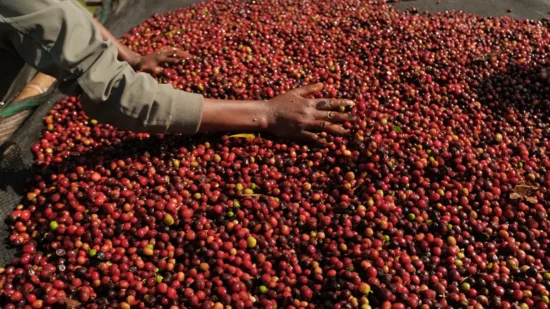
Award-Winning Lots & Roasting
In 2020, when Ethiopia hosted a Cup of Excellence competition, Daye Bensa’s Shantawene lot won seventh place. The group then went on to place eighth in 2021 with their Hamasho lot; in 2022 the same lot won second place. These awards brought prominence and awareness to this exceptional group.
They also started to roast their own coffee under the name Buncho Coffee, and to sell it in their cafés as Dukamo Coffee. There are locations in Addis Ababa (Mafi City Mall, Bole) and Hawassa (Sumuda), and these truly amazing shops brew only Daye Bensa coffee.
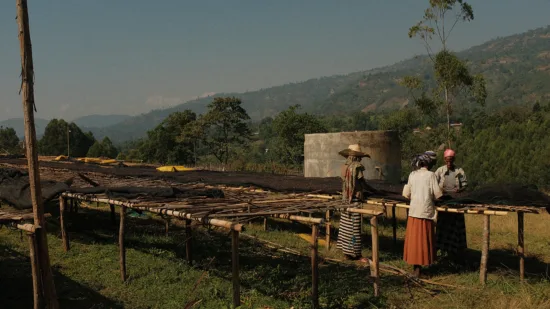
Giving Back to Sidama
Abreham of Daye Bensa explains that, in addition to an immediate cash payment, Daye Bensa offers a second payment as a bonus after the coffee sells. They also have community projects to support farmers, including an initiative to build five schools in deprived areas. “Daye Bensa funded $1 million for the project and it was completed in July 2023,” Abreham says. “These schools are fully equipped and are able to accompany over 1,400 students and provide a better education and alleviate the problem of traveling multiple kilometers to get to school.”
By supporting the farmers and communities they work with and producing exceptional-quality coffee, Daye Bensa is helping to create a promising future for coffee in Sidama.
ABOUT THE AUTHOR
Michaela Tomchek finds coffee an important part of life and the world. She is an appreciator of the crop, the producer, and the many cafés throughout the world serving beautiful beverages. Currently, she writes about coffee, hoping to spread her joy across the globe.
Subscribe and More!
Out now: It’s the February + March 2024 issue of Barista Magazine! Read it for free with our digital edition. And for more than three years’ worth of issues, visit our digital edition archives here.
You can order a hard copy of the magazine through our online store here, or start a subscription for one year or two.

